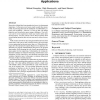Free Online Productivity Tools
i2Speak
i2Symbol
i2OCR
iTex2Img
iWeb2Print
iWeb2Shot
i2Type
iPdf2Split
iPdf2Merge
i2Bopomofo
i2Arabic
i2Style
i2Image
i2PDF
iLatex2Rtf
Sci2ools
108
click to vote
DRM
2003
Springer
2003
Springer
Obfuscation of design intent in object-oriented applications
Protection of digital data from unauthorized access is of paramount importance. In the past several years, much research has concentrated on protecting data from the standpoint of confidentiality, integrity and availability. Software is a form of data with unique properties and its protection poses unique challenges. First, software can be reverse engineered, which may result in stolen intellectual property. Second, software can be altered with the intent of performing operations this software must not be allowed to perform. With commercial software increasingly distributed in forms from which source code can be easily extracted, such as Java bytecodes, reverse engineering has become easier than ever. Obfuscation techniques have been proposed to impede illegal reverse engineers. Obfuscations are program transformations that preserve the program functionality while obscuring the code, thereby protecting the program against reverse engineering. Unfortunately, the existing obfuscation t...
Related Content
| Added | 06 Jul 2010 |
| Updated | 06 Jul 2010 |
| Type | Conference |
| Year | 2003 |
| Where | DRM |
| Authors | Mikhail Sosonkin, Gleb Naumovich, Nasir D. Memon |
Comments (0)

